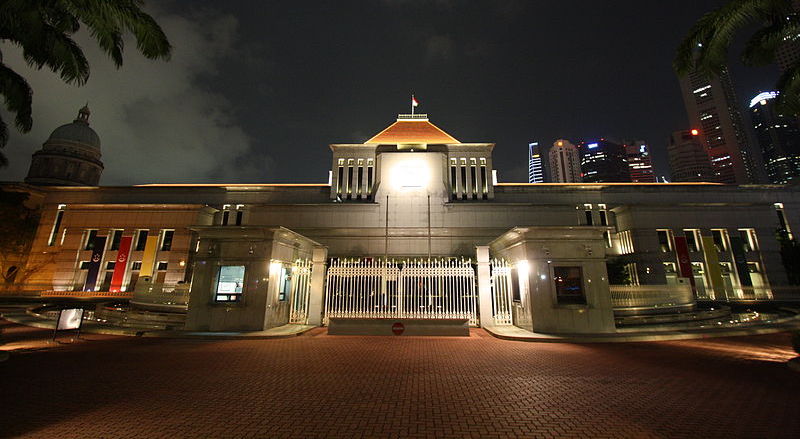Of growth and glory: 4G’s for Christians to consider during GE2020
Elder Jimmy Tan // July 6, 2020, 6:42 pm

"Since governments only exist under the sovereignty of God, they serve not only for the good of the country but also God’s ultimate purpose to bring glory to his name," Elder Jimmy Tan points out. Photo via Wikimedia Commons.
Singaporeans are going to the polls on July 10. But before you are next tempted to rant online for or against any party, or resign yourself in apathy, here are 4Gs from Scripture about how God views all local governments, regardless of who finally represents us.
(Many of the points are based on my reflections on an excellent article entitled, The Purpose and Role of Government by Michael Oh in the ESV Global Study Bible, which I hope you will also read.)
3. Governments are for our growth
Unlikely as it seems, governments often serve to sanctify Christians, to prune and make us more and more like Christ.
For most Christians in Singapore, sanctification doesn’t come so much in persecution but in how we overcome slippery tests.
Biblically, this has taken the form of outright persecution, where suffering becomes a tool God used to mature one’s faith or to advance His work (Romans 5:3-4; 2 Corinthians 12:9-10; Genesis 50:20).
This is still happening to the Church in many parts of the world. Just because we are spared doesn’t excuse us from being thankful for our government and, in the same breath, praying for our brethren facing this harsh reality.
For most Christians in Singapore, I suspect sanctification doesn’t come so much in persecution but in how we overcome more slippery tests – like when certain values are de-emphasised or over-emphasised.
For instance, what is our Singapore version of spiritual success? Isn’t it true Christians and churches here (and in other prosperous societies) need to work hard to resist guaranteeing material success or health in our gospel package? What about the ever present danger of bringing our trademark pragmatism to the table of ministry discussions?
All these situations and temptations can help purify and sanctify the church (Romans 8:28).
Our refinement as His redeemed will also progress when we choose to submit to every authority God places over us, recognising them as His agents. Admittedly, for some it is hard, like taking bitter but good medicine. But as we give the office holder the respect and honour due them (Romans 13:7), pray for them (1 Timothy 2:1-2) and be subject to their laws (Romans 13:1-5; 1 Peter 2:13-14), God smiles at us as we can’t but become more like His Son.
We subject ourselves not because we agree with every policy or implementation or that we necessarily like the politician. We do so supremely because of the worthiness of Christ who calls us to submit. (It’s the same motivation when we submit to a church leader we may disagree with.) How God’s ways are higher than ours!
We thank God for religious freedom rather than religious imposition here. It is a basic right we must rest securely in as we continue to reach out with the gospel of salvation. And God forbid if we think only a Christian state can extend His Kingdom purposes.
God made humans as responsible beings with the two unique gifts of conscience (to discern between alternatives) and freedom (to choose between them).
John Stott further elaborates in Issues Facing Christians Today that: “Whatever the condition of the person’s conscience, even when it is mistaken, it is to be respected. Weak consciences need to be strengthened, and deceiving consciences enlightened, but there must be no bullying of consciences … In general, consciences are to be educated, not violated. This principle, which arises out of the Christian doctrine of man, should affect our social behaviour and institutions.”
For our God, in dignifying all humans being made in His image, prefers persuasion, calling out, “Come now, let us reason together…” (Isaiah 1:18).
Prayer Pause
Help us, Father, to see that governments also help us in our spiritual growth. In holding fast to your word, may we be moulded as we submit to the authorities you have instituted as well as resist imbibing or accepting values which are not of you, but which may be popular.
Help us to use persuasion by use of moral argument to win over those who disagree. And help us to graciously respect them if we don’t manage to.
We thank you for religious freedom. We pray for those in authority to continue to protect this good which many of our brethren do not enjoy elsewhere.
4. Governments are for His Glory
How do governments serve God’s glory? Since governments only exist under the sovereignty of God, they serve not only for the good of the country but also God’s ultimate purpose to bring glory to his name.
“The Lord has made everything for its purpose,
even the wicked for the day of trouble.” (Proverbs 16:4)
“I am the Lord; that is my name;
my glory I give to no other,
nor my praise to carved idols.” (Isaiah 42:8)
As we seek the welfare of our city, let us also wisely and circumspectly remain undistracted and undivided.
Creativity and diversity in the created world, and in the cultures and languages worldwide, reflect God’s glory. So also the diversity of governments around the world. No two democracies are ever alike, something one is apt to forget.
“All the nations you have made shall come
and worship before you, O Lord,
and shall glorify your name.” (Psalms 86:9)
Until then, whatever the state of our government, we are meant to long for that Day of God’s perfect Kingdom. Where governments are unable or unwilling to act justly or do good for their countrymen, we look to God who is perfectly just and satisfying, omnipotent and in sovereign control.
Let me offer, as the final prayer pause, Michael Oh’s concluding thoughts, which give us cause for sober and prayerful reflection as well as joyful anticipation:
Prayer Pause:
“Until that day, we who are the people of God are to faithfully fulfil our responsibilities as citizens both of our respective governments and of heaven (Philippians 3:20). Our message is the gospel message of the kingdom that is to be proclaimed to all nations and until the end comes (Matthew 24:14).
Whether our behaviour is commended by governments (Romans 13:3) or we are delivered up “to tribulation,” “hated by all nations,” and put “to death” (Matthew 24:9) we persevere with hope. And we eagerly await the Lord’s return, with passion for the global and eternal worship of Christ that we see mirrored in Revelation 7:9-10:
After this I looked, and behold, a great multitude that no one could number, from every nation, from all tribes and peoples and languages, standing before the throne and before the Lamb, clothed in white robes, with palm branches in their hands, and crying out with a loud voice, “Salvation belongs to our God who sits on the throne, and to the Lamb!”
So as we exercise our privilege to cast our vote, let us also remember where our ultimate and enduring citizenship lies. For while all governments are temporal, God’s Kingdom and the Gospel message that birthed it is eternal.
As we seek the welfare of our city (Jeremiah 29:7), let us also wisely and circumspectly remain undistracted and undivided. For He is and should remain our peace (Ephesians 2:14).
Hallelujah!
These are two of four pointers as a call to prayer for Christians in the upcoming General Elections 2020. Read the first part here.
We are an independent, non-profit organisation that relies on the generosity of our readers, such as yourself, to continue serving the kingdom. Every dollar donated goes directly back into our editorial coverage.
Would you consider partnering with us in our kingdom work by supporting us financially, either as a one-off donation, or a recurring pledge?
Support Salt&Light



